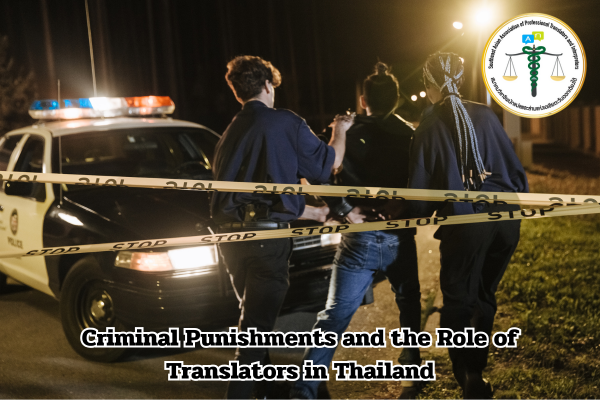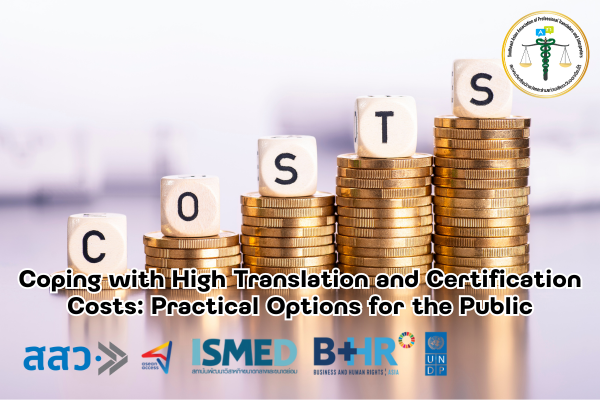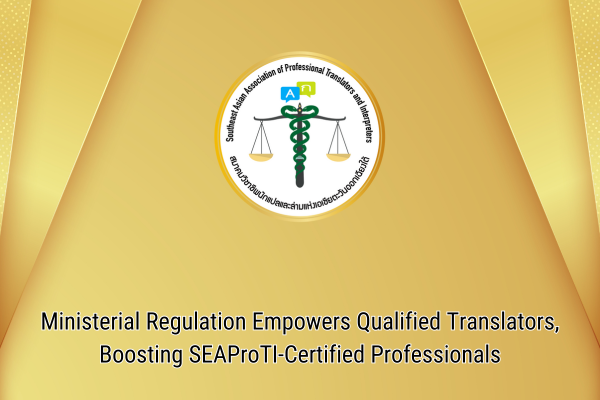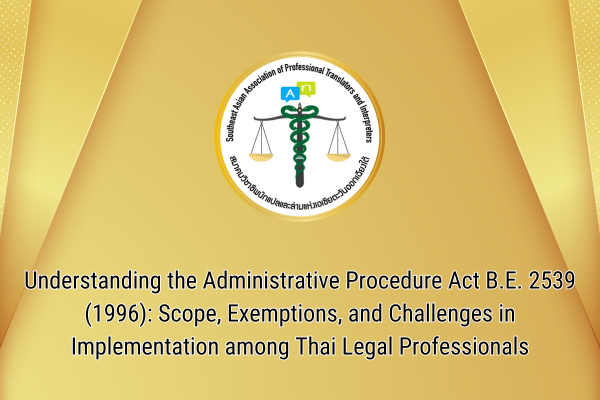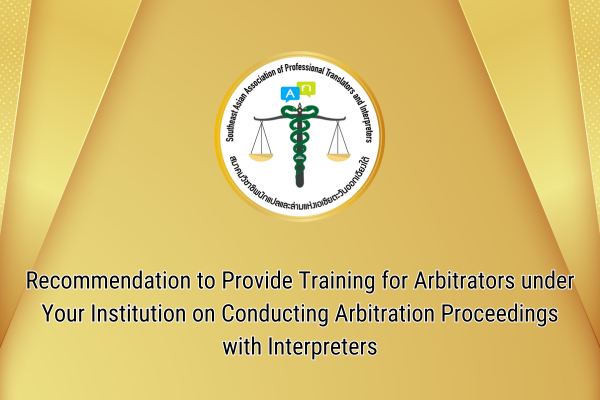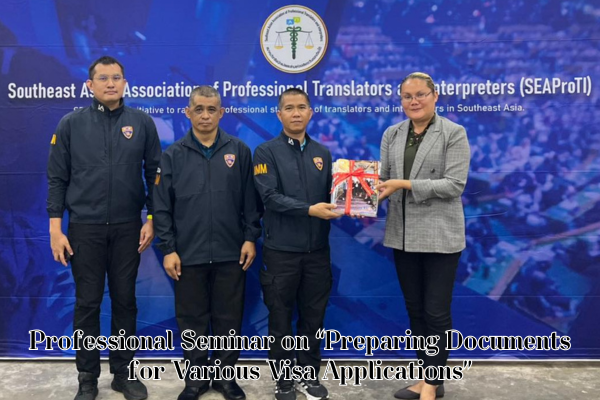Criminal Punishments in Thailand and the Role of Certified Translators and Interpreters
5 February 2025, Bangkok – In Thailand, the punishments for crimes are diverse and depend on the nature and severity of the offense. According to Section 18 of the Thai Criminal Code, the possible punishments include the death penalty, imprisonment, confinement, fines, and forfeiture of property.
The death penalty in Thailand is carried out through lethal injection. The execution does not happen immediately, as the convicted person has the right to appeal to two more courts and can apply for a royal pardon. The execution takes place at Bang Kwang Prison in Bangkok.
In contrast to many European countries and certain U.S. states, life imprisonment in Thailand means imprisonment for the convict’s entire life. There is no possibility of parole unless the law provides otherwise, unlike in some countries where life imprisonment can be followed by a review for potential release if the individual is no longer considered a threat to society.
The prison sentence begins on the date of the judgment. Any time the defendant has already spent in detention before the judgment will be deducted from the total sentence.
If the sentence is less than three months, the court may impose confinement instead of imprisonment. However, this is only applicable if the individual has no prior imprisonment record.
For those under 18 years of age, the death penalty and life imprisonment are not applicable. Instead, they will be sentenced to a maximum of 50 years in prison.
Confinement, which is a less severe form of punishment, involves detaining the individual in a location other than a prison, such as their own home. The court may also assign a supervisor to ensure the conditions of confinement are met. If the person violates the conditions or commits another offense, the confinement may be replaced by imprisonment.
Fines require the convicted person to pay a specified amount to the court. If the fine is not paid, the authorities may seize the person’s property or impose confinement. One day of confinement counts as payment for 200 THB.
For fines not exceeding 80,000 THB, if the person cannot pay, the judgment may be modified to require community service or work for the public good. The nature of the service depends on the individual’s health and circumstances, with one day of work counting as 200 THB.
Forfeiture is another form of punishment, where the court may order the seizure of property involved in or acquired through the commission of a crime. The property is transferred to the government’s ownership unless the court orders otherwise.
The Role of Certified Translators and Interpreters in the Judicial Process
In the judicial process in Thailand, translation and interpretation play a vital role, especially when the parties involved in a case do not speak Thai as their first language. Certified translators and interpreters help ensure that the legal proceedings are fair and transparent, making sure that no rights are overlooked due to language barriers.
Certified translators and interpreters accredited by SEAProTI are crucial in providing accurate translations and interpretations. These professionals are responsible for translating legal documents, such as testimony, judgments, and other legal papers, to ensure that they are correctly understood by all parties involved. The accuracy of these translations is essential to avoid any misunderstandings that may affect the fairness of the trial.
Interpreters, specifically, play a crucial role in the courtroom, translating conversations between non-Thai speakers and Thai speakers. This allows the trial to proceed without any communication issues, ensuring that the defendant, plaintiff, and witnesses all understand the proceedings and can express themselves clearly.
Certified translators and interpreters accredited by SEAProTI must have extensive knowledge of both the source and target languages, as well as a deep understanding of legal terminology and procedures. This expertise helps ensure that translations and interpretations are precise and effective, allowing the judicial system to function smoothly and equitably.
Conclusion
The criminal punishments in Thailand range from the death penalty to fines and forfeiture of property, depending on the crime committed. Translation and interpretation are essential elements of the judicial process, especially when individuals involved in a case do not speak Thai as their first language. Certified translators and interpreters accredited by SEAProTI play a significant role in ensuring that the legal process is fair, transparent, and accurate. By providing accurate translations and interpretations, they help maintain the integrity of the judicial system and ensure that all parties understand the proceedings.
SEAProTI’s certified translators, translation certification providers, and certified interpreters:
The Southeast Asian Association of Professional Translators and Interpreters (SEAProTI) has officially announced the criteria and qualifications for individuals to register as “Certified Translators,” “Translation Certification Providers,” and “Certified Interpreters” under the association’s regulations. These guidelines are detailed in Sections 9 and 10 of the Royal Thai Government Gazette, issued by the Secretariat of the Cabinet under the Office of the Prime Minister of the Kingdom of Thailand, dated July 25, 2024, Volume 141, Part 66 Ng, Page 100.
To read the full publication, visit the Royal Thai Government Gazette
การลงโทษทางอาญาในประเทศไทยและบทบาทของนักแปลรับรองและล่ามรับรอง
5 กุมภาพันธ์ 2568, กรุงเทพมหานคร – ในประเทศไทย การลงโทษผู้กระทำความผิดตามกฎหมายอาญามีหลากหลายรูปแบบ ขึ้นอยู่กับลักษณะและความรุนแรงของอาชญากรรมที่เกิดขึ้น ตามประมวลกฎหมายอาญามาตรา 18 กำหนดไว้ว่า การลงโทษที่อาจจะเกิดขึ้นได้แก่ การประหารชีวิต การจำคุก การกักขัง การปรับ และการยึดทรัพย์สิน
การประหารชีวิตในประเทศไทยใช้วิธีการฉีดยาพิษ โดยการประหารจะเกิดขึ้นหลังจากที่ผู้ต้องขังมีสิทธิ์อุทธรณ์ในสองศาล และสามารถยื่นขอพระราชทานอภัยโทษได้ การประหารชีวิตจะเกิดขึ้นที่เรือนจำบางขวาง ซึ่งตั้งอยู่ในกรุงเทพฯ
ส่วนการจำคุกในประเทศไทยนั้นหมายถึงการจำคุกตลอดชีวิต ซึ่งแตกต่างจากหลายประเทศที่อาจมีการปล่อยตัวก่อนเวลาได้หากผู้ต้องขังไม่เป็นภัยต่อสังคม แต่ในประเทศไทย การจำคุกตลอดชีวิตจะหมายถึงการถูกขังตลอดไป
การจำคุกจะเริ่มต้นนับจากวันที่ศาลตัดสิน และหากผู้ต้องขังถูกควบคุมตัวก่อนแล้ว วันเวลาที่ถูกควบคุมตัวจะถูกหักออกจากระยะเวลาของโทษจำคุก
ในกรณีที่การจำคุกไม่เกิน 3 เดือน ศาลสามารถสั่งให้ใช้การกักขังแทนการจำคุกได้ แต่ต้องเป็นกรณีที่ผู้ต้องหายังไม่เคยถูกจำคุกมาก่อน
สำหรับผู้ที่มีอายุต่ำกว่า 18 ปี การประหารชีวิตและการจำคุกตลอดชีวิตจะไม่สามารถทำได้ โดยจะได้รับโทษจำคุกไม่เกิน 50 ปีแทน
การกักขังเป็นการลงโทษในสถานที่ที่ไม่ใช่เรือนจำ เช่น บ้านของผู้ต้องหาเอง โดยศาลสามารถกำหนดเงื่อนไขต่างๆ เช่น การแต่งตั้งผู้ดูแลและกำหนดให้ผู้ถูกกักขังต้องทำตามเงื่อนไขเหล่านั้น หากไม่ปฏิบัติตามหรือกระทำความผิดซ้ำ ศาลสามารถเปลี่ยนโทษจากการกักขังเป็นการจำคุกได้
ในกรณีของการปรับ หากผู้กระทำผิดไม่สามารถจ่ายค่าปรับได้ ศาลสามารถยึดทรัพย์สินของผู้กระทำผิด หรือสั่งให้ถูกกักขังเพื่อชดใช้ค่าปรับ
สำหรับการยึดทรัพย์สินนั้น ศาลจะยึดทรัพย์สินที่เกี่ยวข้องกับการกระทำผิด หรือทรัพย์สินที่ได้รับจากการกระทำผิด ซึ่งจะตกเป็นกรรมสิทธิ์ของรัฐเว้นแต่จะมีการทำลายหรือคืนทรัพย์สิน
บทบาทของนักแปลรับรองและล่ามรับรองในกระบวนการยุติธรรม
การแปลและการให้บริการล่ามในกระบวนการยุติธรรมของไทยนั้นมีความสำคัญอย่างยิ่ง โดยเฉพาะเมื่อผู้เกี่ยวข้องในคดีไม่สามารถใช้ภาษาไทยได้ การแปลเอกสารและการแปลภาษาในการพิจารณาคดีทำให้กระบวนการยุติธรรมเป็นไปอย่างราบรื่น และไม่มีการละเลยสิทธิของผู้ต้องหาหรือผู้เสียหาย
ในกรณีนี้ นักแปลรับรองและล่ามรับรองที่ได้รับการรับรองจากสมาคมวิชาชีพนักแปลและล่ามแห่งเอเชียตะวันออกเฉียงใต้ (SEAProTI) จะเข้ามามีบทบาทในการช่วยแปลภาษาทั้งเอกสารทางกฎหมายและในการสื่อสารในห้องพิจารณาคดี โดยเน้นการแปลอย่างถูกต้องและเป็นกลาง เพื่อให้ทุกฝ่ายสามารถเข้าใจได้อย่างชัดเจน
นักแปลรับรองจะมีหน้าที่ในการแปลเอกสารทางกฎหมาย เช่น คำให้การ คำพิพากษา หรือเอกสารอื่นๆ ซึ่งการแปลในกรณีนี้ต้องทำด้วยความระมัดระวังเพื่อหลีกเลี่ยงการตีความผิด ในขณะที่ล่ามรับรองจะช่วยแปลในระหว่างการพิจารณาคดี ซึ่งทำให้การพิจารณาคดีเป็นไปได้อย่างราบรื่นและไม่มีการสื่อสารผิดพลาด
นักแปลและล่ามรับรองที่ได้รับการรับรองจาก SEAProTI จะต้องมีความรู้ทั้งในด้านภาษาที่แปลและด้านกฎหมาย เพื่อให้การแปลและการแปลภาษามีความถูกต้องและชัดเจน และยังต้องเข้าใจกระบวนการยุติธรรมเพื่อให้สามารถให้บริการได้อย่างมีประสิทธิภาพ
สรุป
การลงโทษในประเทศไทยมีหลายประเภท ตั้งแต่การประหารชีวิต การจำคุก การกักขัง การปรับ และการยึดทรัพย์สิน ขึ้นอยู่กับลักษณะของการกระทำความผิด การแปลและการให้บริการล่ามมีบทบาทสำคัญในการให้กระบวนการยุติธรรมเป็นไปอย่างถูกต้องและยุติธรรม โดยนักแปลรับรองและล่ามรับรองจาก SEAProTI ช่วยให้การแปลเอกสารและการแปลภาษาในการพิจารณาคดีเป็นไปอย่างถูกต้อง ชัดเจน และเป็นกลาง
เกี่ยวกับนักแปลรับรอง ผู้รับรองการแปล และล่ามรับรองของสมาคมวิชาชีพนักแปลและล่ามแห่งเอเชียตะวันออกเฉียงใต้
สมาคมวิชาชีพนักแปลและล่ามแห่งเอเชียตะวันออกเฉียงใต้ (SEAProTI) ได้ประกาศหลักเกณฑ์และคุณสมบัติผู้ที่ขึ้นทะเบียนเป็น “นักแปลรับรอง (Certified Translators) และผู้รับรองการแปล (Translation Certification Providers) และล่ามรับรอง (Certified Interpreters)” ของสมาคม หมวดที่ 9 และหมวดที่ 10 ในราชกิจจานุเบกษา ของสำนักเลขาธิการคณะรัฐมนตรี ในสำนักนายกรัฐมนตรี แห่งราชอาณาจักรไทย ลงวันที่ 25 ก.ค. 2567 เล่มที่ 141 ตอนที่ 66 ง หน้า 100 อ่านฉบับเต็มได้ที่: นักแปลรับรอง ผู้รับรองการแปล และล่ามรับรอง


